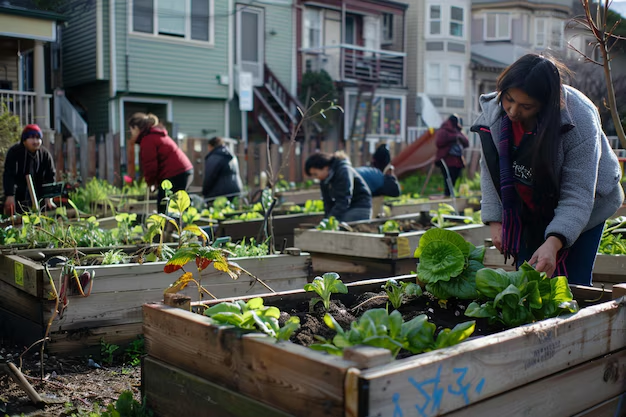How Community Gardens Cultivate Empowerment and Unity
In an era where urban landscapes expand at an unprecedented rate, and individuals often find themselves disconnected from the very communities they reside in, community gardens stand as vital green oases that provide more than just a respite for urban dwellers. These lush spaces are not only rich in greenery and fresh produce—they are abundant in opportunities for empowerment, unity, and communal resilience.
The Power of Community Gardens
A Nexus for Social Connection
Community gardens serve as a hub where individuals from diverse backgrounds come together to share in the joys of gardening. This shared activity fosters a sense of community and belonging. Whether one is embarking on their first planting or is an experienced gardener, the exchange of knowledge and skills enriches all participants.
- Building Bonds: Gardening becomes a shared language across cultures, ages, and social backgrounds, promoting inclusivity.
- Engagement vs. Isolation: Regular interactions in the garden can combat feelings of loneliness, fostering social ties and networks that spill over into other aspects of life.
Educational Opportunities
These spaces are not just about tilling soil and growing vegetables—they are fertile ground for education and personal development.
- Learning by Doing: Gardens provide a practical environment for learning about botany, ecology, and sustainable agriculture.
- Intergenerational Learning: Young members can gain wisdom from older generations, while modern techniques can rejuvenate the gardening approaches of more seasoned gardeners.
A Path to Empowerment
Community gardens frequently act as catalysts for personal growth and empowerment. Gardeners are responsible for their plots and decisions, fostering a sense of autonomy and self-reliance.
- Skill Development: Participants learn a range of skills, from practical gardening to project management and leadership.
- Food Security: Access to fresh produce can be instrumental for communities where food deserts prevail, improving nutrition and health.
Environmental and Economic Benefits
Boosting Urban Biodiversity
Adding a patch of green in an urban jungle does wonders for the local environment.
- Habitats for Wildlife: Gardens provide homes for beneficial insects, birds, and small animals, contributing to biodiversity.
- Mitigating Urban Heat: Plants cool the air and provide shade, contributing to climate change mitigation efforts.
Economic Savings
Engaging in gardening can lead to significant economic savings for individuals and communities alike.
- Cost-effective Food Production: Growing your food reduces grocery bills and reliance on expensive store-bought produce.
- Economic Revitalization: Thriving gardens enhance neighborhood appeal, potentially increasing property values.
Getting Involved: Starting or Joining a Community Garden
Find Your Local Garden
Start by searching for community gardens in your area. Libraries, community centers, or local government websites are good places to begin your inquiry.
- Visiting Before Joining: Attend a few meetings or volunteer on workdays to get a feel for the garden's dynamic and member expectations.
Starting Your Own Garden
When existing community gardens are not available or suitable, starting one might be the best option.
- Location and Permissions: Secure a space with permission from landowners. Consider proximity to participants for easy access.
- Planning and Design: Consider the garden's layout and what crops to plant based on local climate and community needs.
Tips for Successful Community Gardening
- Build a Strong Committee: Establish a committee to oversee operations, fundraising, and decision-making.
- Establish Rules and Goals: Clear guidelines help manage all aspects of the garden and ensure everyone is on the same page.
Overcoming Challenges
Navigating Conflicts
Every community endeavor faces challenges.
- Conflict Resolution Skills: Implement strategies for resolving differences among participants in a peaceful and constructive manner.
- Transparent Communication: Regular meetings and open communication channels prevent misunderstandings and build trust.
Ensuring Sustainability
- Funding and Resources: Seek sponsorships, grants, or crowdfunding opportunities to sustain the garden.
- Volunteer Engagement: Regularly engage volunteers to keep the garden vibrant and well-maintained.
Celebrating Success
Community Gatherings and Events
- Harvest Festivals: Celebrate the hard work with events that bring the larger community together to enjoy the fruits of their labor.
- Educational Workshops: Host workshops on topics like composting, beekeeping, and more to enhance members' knowledge.
Measuring Impact
While the harvest is a tangible reward, the true value of community gardens goes beyond produce.
- Social Impact: Survey members to understand the garden's impact on community cohesion and individual well-being.
- Environmental Benefits: Track biodiversity increases and reductions in community food miles due to the garden.
Key Takeaways: The Many Benefits of Community Gardens 🌱
- Unity Through Diversity: Community gardens bring people together across cultural and generational divides.
- Environmental Allies: They support biodiversity, offer cooling effects, and can even improve local air quality.
- Economic Resilience: With food production and cost-saving opportunities, gardens bolster both community and individual economies.
- Empowerment and Education: These gardens offer a platform for skill development and experiential learning for all ages.
- Sustainability: From a strong community core to resourceful management, sustainable gardens thrive long-term.
Ultimately, community gardens stand as a testament to what can be achieved when people come together. More than just a patch of green, they are a living, breathing part of the community fabric, where seeds of empowerment and unity grow alongside those of fruits and vegetables. By participating in or starting a community garden, individuals take active roles in shaping both their personal well-being and the collective health of their community. These gardens might begin as empty plots of land, but with each planted seed, they cultivate potential, connection, and hope. 🌿

Related Topics
- A Comprehensive Guide To Community Cooperative Childcare: A Grassroots Solution
- A Guide To Online Second-Hand Shopping: Platforms, Tips, And Tricks
- Affordable After-School Programs And Clubs: A Complete Guide
- Affordable Group Therapy: Benefits And How To Find
- Affordable Natural Therapies For Mental Well-being
- Avoiding Financial Scams And Pitfalls: A Comprehensive Guide
- Backpacking On a Budget: A Guide For The Minimalist Traveler
- Beginners Guide To Thrifting: Stretching Your Dollar Further
- Beyond Clothing: Thrifty Finds For Home And Kitchen
- Budget-friendly Garden Start-ups: From Seeds To Harvest
